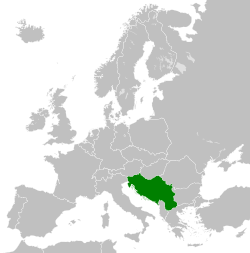Ex-Yugoslavian countries
| Socialist Federal Republic of Yugoslavia | ||||||||||||||||||||
|
Socijalistička Federativna Republika Jugoslavija Социјалистичка Федеративна Република Југославија Socialistična federativna republika Jugoslavija |
||||||||||||||||||||
|
||||||||||||||||||||
|
Motto Bratstvo i jedinstvo "Brotherhood and unity" |
||||||||||||||||||||
|
Anthem Hej, Slaveni Хеј, Словени "Hey, Slavs" |
||||||||||||||||||||
|
Yugoslavia in 1989
|
||||||||||||||||||||
| Capital | Belgrade | |||||||||||||||||||
| Languages |
Serbo-Croatian Slovene Macedonian |
|||||||||||||||||||
| Demonym | Yugoslav or Yugoslavian | |||||||||||||||||||
| Government | Federal Titoist one-party socialist republic | |||||||||||||||||||
| President | ||||||||||||||||||||
| • | 1945–1953 | Ivan Ribar (first) | ||||||||||||||||||
| • | 1953–1980 | Josip Broz Tito | ||||||||||||||||||
| • | 1991 | Stjepan Mesić (last) | ||||||||||||||||||
| Prime Minister | ||||||||||||||||||||
| • | 1945–1963 | Josip Broz Tito (first) | ||||||||||||||||||
| • | 1989–1991 | Ante Marković (last) | ||||||||||||||||||
| General Secretary | ||||||||||||||||||||
| • | 1945–1980 | Josip Broz Tito (first) | ||||||||||||||||||
| • | 1989–1990 | Milan Pančevski (last) | ||||||||||||||||||
| Legislature | Federal Assembly | |||||||||||||||||||
| • | Upper house | Chamber of Republics | ||||||||||||||||||
| • | Lower house | Federal Chamber | ||||||||||||||||||
| Historical era | Cold War | |||||||||||||||||||
| • | AVNOJ | 26 November 1942 | ||||||||||||||||||
| • | Admitted to the United Nations | 24 October 1945 | ||||||||||||||||||
| • | Proclamation | 29 November 1945 | ||||||||||||||||||
| • | Constitution adopted | 31 January 1946 | ||||||||||||||||||
| • | Balkan Pact signed | 28 February 1953 | ||||||||||||||||||
| • | Death of Josip Broz Tito | 4 May 1980 | ||||||||||||||||||
| • | Disintegration | 27 April 1992 | ||||||||||||||||||
| Area | ||||||||||||||||||||
| • | 1991 | 255,804 km2 (98,766 sq mi) | ||||||||||||||||||
| Population | ||||||||||||||||||||
| • | 1991 est. | 23,229,846 | ||||||||||||||||||
| Density | 91/km2 (235/sq mi) | |||||||||||||||||||
| Currency | Yugoslav dinar | |||||||||||||||||||
| Internet TLD | .yu | |||||||||||||||||||
| Calling code | +38 | |||||||||||||||||||
|
||||||||||||||||||||
| Today part of | ||||||||||||||||||||
| a. | ^ Full name in the Serbo-Croatian and Macedonian languages, written in the Latin alphabet (see Name section for details). | |||||||||||||||||||
| b. | ^ Full name in Serbo-Croatian and Macedonian, written in Cyrillic. | |||||||||||||||||||
| c. | ^ Full name in the Slovene language (Slovene uses Latin only). | |||||||||||||||||||
| d. | ^ There was no de jure official language at the federal level, but Serbo-Croatian was de facto official. It was also legally the official language in the federal republics of Serbia, Croatia, Bosnia and Herzegovina, and Montenegro. | |||||||||||||||||||
| e. | ^ Official in Slovenia. | |||||||||||||||||||
| f. | ^ Official in Macedonia. | |||||||||||||||||||
| g. | ^ Kosovo is the subject of a territorial dispute between the Republic of Kosovo and the Republic of Serbia. The Republic of Kosovo unilaterally declared independence on 17 February 2008, but Serbia continues to claim it as part of its own sovereign territory. The two governments began to normalise relations in 2013, as part of the Brussels Agreement. Kosovo has received formal recognition as an independent state from 113 out of 193 United Nations member states. | |||||||||||||||||||
The Socialist Federal Republic of Yugoslavia (SFR Yugoslavia or SFRY) was the Yugoslav state in Southeast Europe that existed from its foundation in the aftermath of World War II until its dissolution in 1992 amid the Yugoslav Wars. Covering an area of 255,804 km² (98,766 sq mi), the SFRY was bordered by Italy to the west, Austria and Hungary to the north, Bulgaria and Romania to the east and Albania and Greece to the south.
It was a socialist state and a federation governed by the League of Communists of Yugoslavia made up of six socialist republics: Bosnia and Herzegovina, Croatia, Macedonia, Montenegro, Serbia, and Slovenia with Belgrade as its capital. In addition, it included two autonomous provinces within Serbia: Kosovo and Vojvodina.
...
Wikipedia



